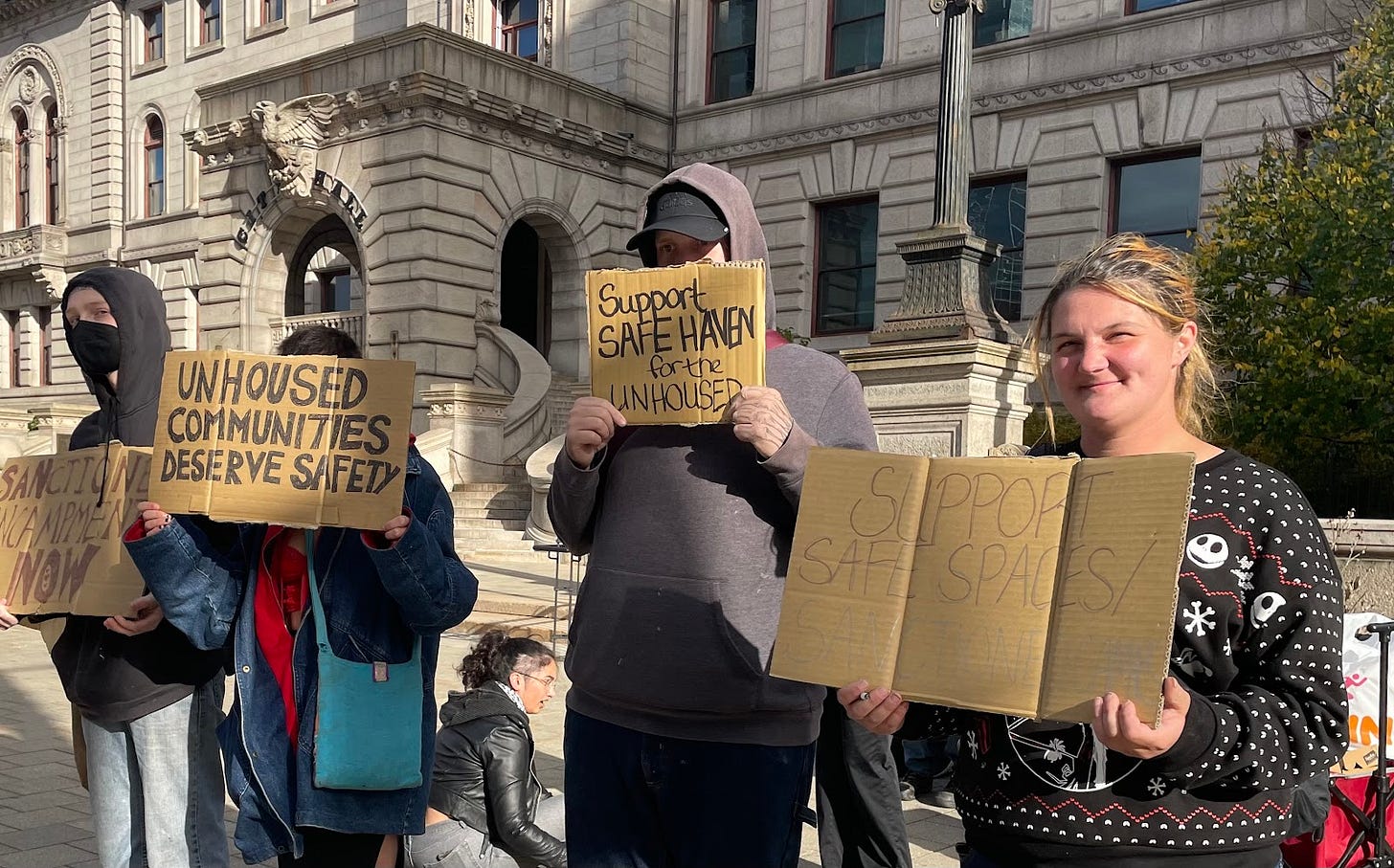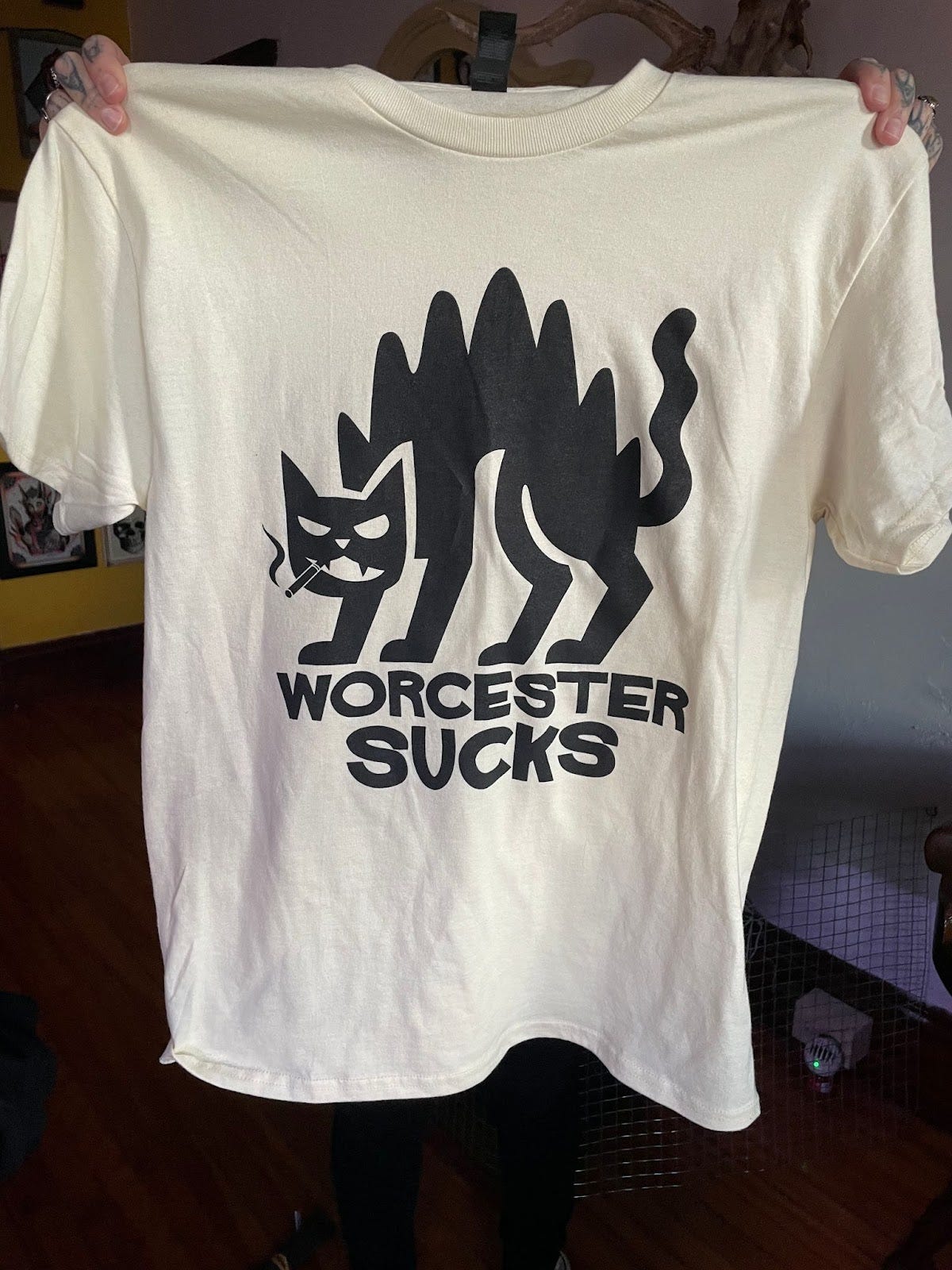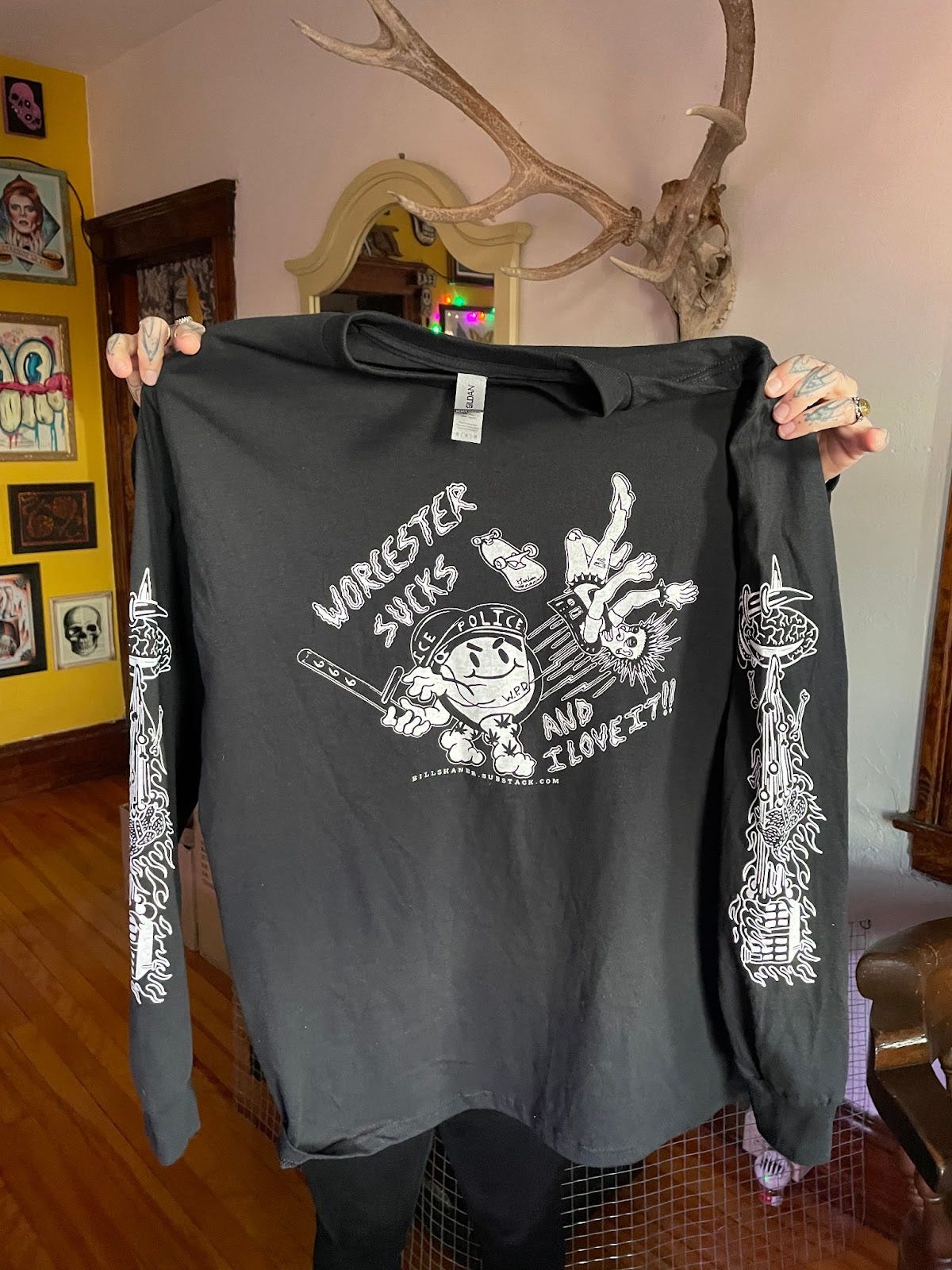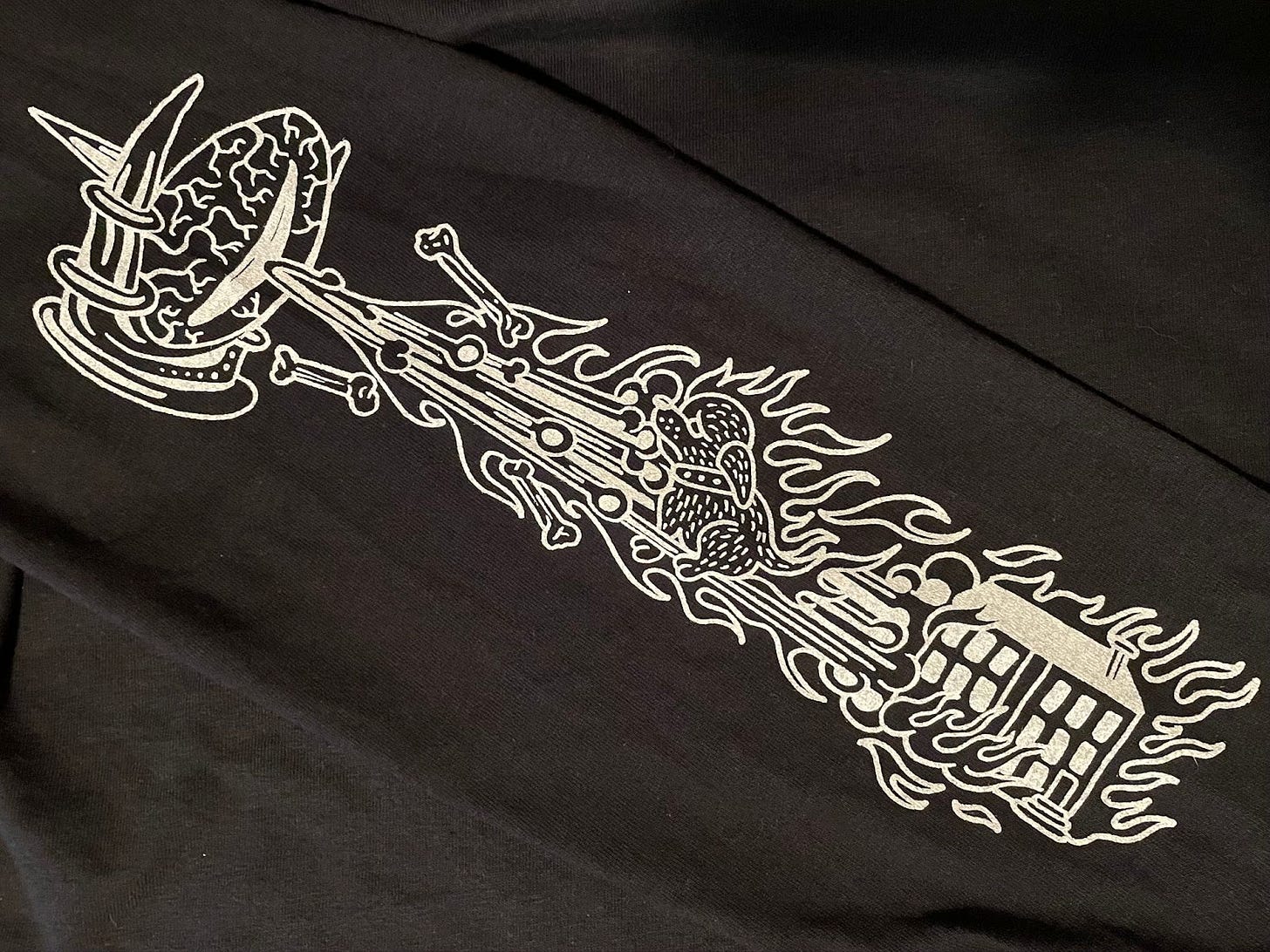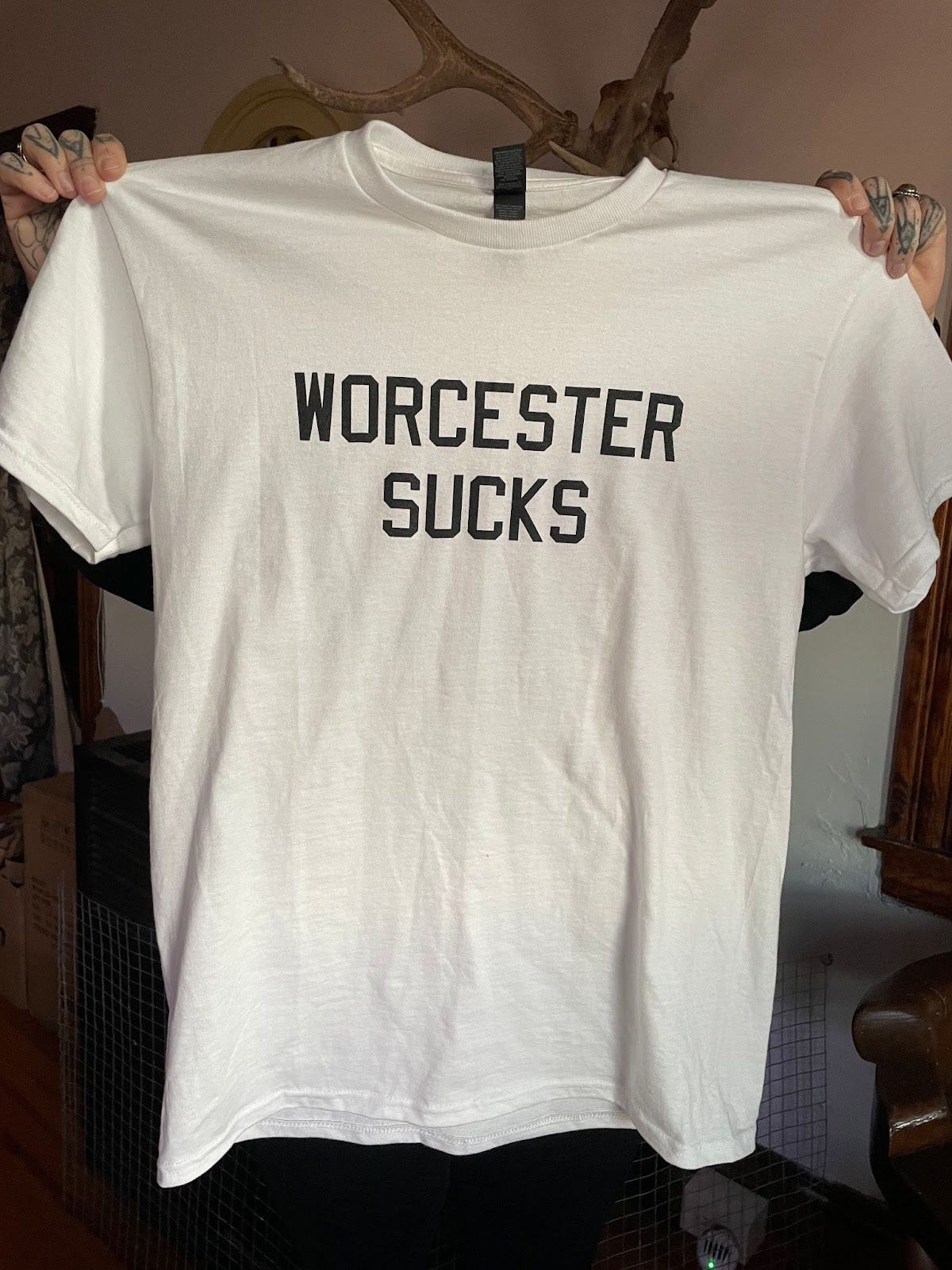They speak of indignity with blood on their hands
A sanctioned encampment would have kept Maryann Audette safe
What’s up Worcester Sucksters! Another late night Sunday post (who knows where the time goes?) My goal is to get these up by noon but it’s tough to post twice a week on time and still have a life. Today for instance publishing was thrown off by my going to the Wachusett Mountain food truck festival with Katie. It was about 500 times busier than we expected. I drank a beer that tasted like thrown-up beer. A father of small children who looked like Dave Portnoy was wearing a sweatshirt with “Iron Dome Defense System” text wrapped in a circle around the silhouette of an Arrow 2 Anti-Ballistic Missile Receptor. And now here we are.
Make sure to vote on Tuesday! And read my election guide if you’re fuzzy on the local races and ballot questions. It’s pointedly short and sweet.
I lost a few people, as expected, by saying in that guide that it doesn’t matter who you vote for in the presidential race, given you live in Massachusetts. It still doesn’t—I’m just calling balls and strikes here. But hoooo boy you should see some of these emails. Like, listen, take it up with the electoral college not this one local newsletter writer.
But president aside, there are a lot of interesting and important down ballot issues, ones where your vote really does matter.
More later in the post but there are three new shirts in the merch store including a very sick long sleeve design by OG Worcester Sucks artist Johnny Garlin. Limited quantities, first come first serve, and this right here is the first time I’ve shared the link anywhere.
A rally for sanctioned encampments—three new shirts in the merch store!—odds and ends
They speak of indignity with blood on their hands
Maryann Audette’s camp site was just over the line into Millbury—as close to the city as she could be without being within the jurisdiction of the WPD.
There are upsides and downsides to that approach, said Sam Olney, HALO organizer (recently interviewed for Worcester Speaks as well). The upside: Getting outside the jurisdiction of the WPD and the Quality of Life team gives you a better chance at some stability.
“I mean we were just in Shrewsbury for four months straight. And we didn’t get moved. And the cops there treat us like humans,” said Olney. “When they came to tell us we had to leave, they gave us two weeks like, I was impressed. They didn’t tell us we had to be out by the end of the day.”
In Worcester it’s a different story. Camp sweeps are often sudden, and the cops leave little time for packing up. Olney compared the Shrewsbury treatment to a time when the WPD removed her from Lake Park.
“They left a note on our tent that said we had 24 hours to pack up, the Quality of Life Team,” she said. She said she emailed Dan Cahill, head of the QoL, to get more time, and he gave another week. “But like come on, you can't do that!”
The downside to getting out from under the QoL: you’re further isolated, cut off from the support of simply having other people around. “You’re farther away from anything,” Olney said. “Especially when you’re in the middle of the woods somewhere, like how are they going to find you?”
Last Saturday night, there was a brush fire in Audette’s just-over-the-line camp. Cops arriving at the scene pronounced her dead. The investigation into the fire and the death are ongoing.
To honor Audette, Olney, her partner David, and supporters held a stand-out at City Hall yesterday afternoon, renewing calls in the wake of her death for a sanctioned encampment site. Audette used to camp around Walmart, then around Holy Cross, they told me. It was only recently that she was setting up way down the bike path, out there in the woods. Sam, David, and Maryann are all people who’ve for years felt the effects of the disastrous large-scale encampment clearing behind the Walmart in October 2021. (For more, my piece at the time: “Options were offered”)
While no substitute for permanent housing, a sanctioned site would solve a lot of short-term problems—ones invariably produced by the lack of stable permanent housing currently available. Most importantly, it would do away with the destabilization of having your camp routinely swept by the WPD. Having to pack up and start over again and again is a major barrier to accessing support services like doctors and case workers and well-meaning people who donate food and supplies. Always on the move, it’s harder for those folks to find you, Olney said. A sanctioned site would provide a steady point-of-contact, and with more contact, more chance of finding stable housing. It’s also a lot safer to camp with the mutual support of other folks around you. A sanctioned site would reliably provide that, as well as other basic safety and sanitary protections. A simple fire extinguisher, and someone around to use it, could have saved Audette’s life, Olney said.
“Well there would have been people around to make sure a fire did not spread like that,” she said.
Same goes for Audette’s health. “So she had health issues, which we are under the assumption she did, she would have been able to get that taken care of, because there are services,” said Olney.
And for any possible foul play, which, to my mind, shouldn’t be written off here as outside the realm of possibility. “If something malicious did happen, it wouldn't be able to happen in the encampment,” said David Koukoulis, Olney’s partner.
There would be fencing and a system for self-policing, modeled after a sanctioned encampment in Oregon that Olney researched extensively for her proposal.
“One of the things I talked about with the guy out in Oregon was that they run the community and the people that live there do the security,” said Olney.
Like I said, the investigation into Audette’s death and the cause of the fire are ongoing. No official cause of either has been released. But still the implied narrative put forward in official press releases and their rewrites was death by brush fire—a tragic accident.
Three days before the fire and Audette’s death, pictures of the encampment were posted to The Truth About Worcester, a Facebook group with 38,000 members. Hundreds of people in the comments demanded that the city “do something” about the camp. Then, something happened.
Regardless, the point stands that Audette would almost certainly still be alive today if she weren’t camping by herself, in an isolated location just over the city line, but in a sanctioned site with basic safety equipment.
As routine encampment sweeps continue to push unhoused people into more dangerous, isolated sites, Olney and others have tried and failed again and again to get city hall to take the idea of a sanctioned encampment site seriously.
Olney put together a 40-page proposal, put it on the council agenda, and met with the city manager. The council voted against simply advancing the idea to a subcommittee discussion by a 6-5 vote, Mayor Joe Petty being the swing vote to kill it. City Manager Eric Batista wrote it off as impractical because the city couldn’t find a service provider to take it on. Olney rejects the need for a single service provider in the style of a SMOC shelter. The camp would run fine without a company managing it as a city subcontractor. In fact it would probably run better.
Past attempts to go around the city and set up an encampment with supportive services were met with violence. In January The RMVillage, an encampment outside the city’s temporary winter shelter that was set up by a separate group of unhoused organizers, was torn down by the WPD at the behest of the city manager within a day. (For more: “The Cruelty Machine made visible”)
Several days later, one of the unhoused women living there died in the hospital.
Since the pandemic, the death toll for unhoused people in Worcester is on the rise. According to numbers kept by the WPD, nine unhoused people died in 2023, up from three in 2022 and two in 2021. So far, there have been four deaths this year, according to WPD data, which a city spokesman was careful to say does not account for anyone who may have died in a hospital.
Real human lives are at stake here. In the case of Audette, we see how city hall is directly culpable. They voted against the sanctioned site proposal which would have saved her life, and they continually reaffirm the endless routine sweeps which drove her into the dangerous situation that took her life. Content to say it was a “tragic accident” and unwilling to assess their role in bringing it about.
As we head into the deadliest season for unhoused people, it’s worth noting there are no formal reporting mechanisms for unhoused people found dead—not at the city, state, or federal level.
Every year for three decades, organizers have held a vigil in Worcester on the longest night of the year for city residents who’ve died while homeless. We’re not entirely sure how many homeless people that is, resigned to say “more than there should be” and leave it at that.
But homelessness is not some force of nature, it is a manufactured condition. It is the result of the free market and a government content to let it trample people to death. Wide-scale federal intervention is needed to solve the problem, but it’s an entirely solvable problem for the federal government. I’m reminded of a moment at the Gaza ceasefire rally at city hall a few weeks ago.
When Patricia Kirkpatrick took the mic, she neatly laid out what we like to call the boomerang of empire. Here in Worcester, she said, we have an ever increasing homeless population, approaching 2,000 by most recent counts with over 700 of those being children. She then cited a UN report from May showing that 79,000 homes in Gaza “have been blown off the map.”
“Why are our tax dollars supporting the annihilation of homes in Gaza instead of giving shelter to our unhoused children and their families?”
Waiting for a federal intervention that’s unlikely to come under Harris or Trump, the city is faced with a choice: pursue policy that makes it better or makes it worse. Reliably, the city has chosen to make it worse, for the benefit of “constituents” like the ones on Truth About Worcester, who want to be able to call the city to “do something” about having to see encampments.
I’ve spent an awful lot of time in this newsletter making that case, and it all revolves around the inhumane and self-defeating practice of routine encampment sweeps. Back in August, I published some data I got from city hall that shows the scope of these sweeps. From January to August, there were 616 enforcement actions—camp visits, camp clearings, “trash removal,” follow-up visits, that, taken together, comprise the process of endlessly sweeping encampments. One such action was called for personally by Mayor Joe Petty. Not a week goes by without some sort of enforcement action on one encampment or another.
Though city hall for some reason takes pains to lie about this, these sweeps are primarily carried out by a multi-department task force called the Quality Of Life Team. It’s made up of police officers, DPW staff, and people from inspectional services. Created in 2015, it’s essentially the garbage police, going after illegally dumped trash, unregistered cars, blighted properties, and the unhoused human beings that register in city hall’s policies and procedures as a sort of walking blight. As with the garbage, the primary objective is to remove the human being from wherever it is they might be. (For more: “We use our garbage police to police homeless people”)
At the rally, there was much talk about a recent lawsuit in New York about such sweeps. From The City, a great independent outlet:
The ashes of deceased relatives, warm clothes in the dead of winter, personal documents and irreplaceable family photographs are just some of the items New Yorkers say were thrown away during homeless encampment sweeps that often take place with little or no warning, according to a new federal lawsuit filed Tuesday.
The city’s own internal policies require at least 48 hours warning ahead of such sweeps, and for people to have most of their belongings stored for up to 90 days.
But in practice, the new lawsuit filed by six homeless New Yorkers and the Urban Justice Center Safety Net Project alleges that city officials regularly violate those procedures, sweeping encampments over and over again with little or no warning and simply throwing people’s possessions away.
The suit may become a class action one, as the effects are so widely felt by so many New Yorkers.
“Sweeps are cruel, counterproductive, and cause immense harm to homeless New Yorkers,” said Natalie Druce, a staff attorney with the Urban Justice Center – Safety Net Project...
Could such a lawsuit be repeatable here? I should think so. Besides the scale of it, there’s not a lot of difference between how the NYPD and the WPD sweep encampments. The city is supposed to give a week before clearing, but that’s often ignored. Worcester, like New York, says they hold onto people’s belongings when they clear an encampment but stuff just happens to get thrown out—especially when WPD officers on the scene make the unilateral determination that an encampment is “abandoned.”
The messaging from city officials is also remarkably similar.
In New York, a spokesman had this to say about the lawsuit:
William Fowler, a spokesperson for Adams, defended the city’s approach to homeless encampments, saying more than 2,000 people who had lived on the streets made it into permanent housing in the past two fiscal years.
“The city’s homeless encampment outreach and clean up efforts operate under one defining principle: that there is nothing dignified about being forced to sleep on the streets,” Fowler said. “Rather than walking past an encampment and doing nothing to help those in need, we treat people experiencing homelessness with dignity, offering to connect them to housing, health care, and to properly store their valuables while temporary structures not meant to be lived in are removed.”
In Worcester, here’s a few choice examples.
City manager Eric Batista June 2023:
"I know it's not very popular for us to be moving people along, but we have to do that," Batista said. "We have to do that to make sure that people are safe in these encampments as well.”
Councilor Kate Toomey February 2024:
"I can’t support having our public spaces taken like that," At-Large Councilor Kate Toomey said in reference to Olney's petition. "We need to be able to understand this isn’t just putting someone in a house, or let someone have a tent. It’s a very complex situation and I don’t think it’s something that can be settled in just one order, just one petition."
Councilor Donna Colorio June 2023:
"It is inhumane to leave people in the woods who need medical or psychological help because of mental health or substance abuse issues. I was able to see first hand what these encampments are about and no human being should be allowed to live in these awful situations," Colorio said in a statement. "As a council member I believe we should focus on the issues of mental health and substance abuse not leave them in the woods for months to die."
In all of these comments, we see a similar strain of logic, one symptomatic of an advanced case of Democrat Brain (to which, Colorio shows us, Republicans are not immune). To live outside is undignified, they say. We can’t allow it, they say. But what they don’t say is that the alternative currently on offer is less dignified than a tent, less readily available, and often much more dangerous. What they don’t say is that people choose the elements over the patchwork of temporary shelters and almost non-existent permanent supportive housing for a reason.
They speak of indignity, but don’t consider the unhoused to be rational actors.
While these local officials are out front, preaching about the indignity of unsheltered homelessness, in the background their police departments go about the quiet work of shuffling people around the city, every day inflicting indignity on top of indignity—the unhoused made to suffer forced relocations on a routine basis, their personhood treated as much like trash as their belongings.
So they’re driven, like Audette, farther into the woods and further away from stability. Colorio says we can’t “leave them in the woods for months to die,” while she plays her part in maintaining a political reality that manifestly produces that outcome. Same as Joe Petty and Kate Toomey and Eric Adams and Eric Batista. And every time someone does die, it’s a tragedy, an accident, an isolated incident.
They speak of indignity with blood on their hands, and take it for granted they’re rational actors.
Become a member of the Worcester Sucks Booster Club!
This part’s for free subscribers, paid subscribers can move onto the next section because you already know (and thank you so much!)
When you upgrade your subscription to paid, you become part of the roughly 700-725 people (it goes up and down) who make sure Worcester Sucks keeps providing aggressive, irreverent reporting—always always always centering the resident over the suit, our love for the city matched only by our distrust of its political class.
What we do, between my work, WPS In Brief, Worcester Speaks, Bad Advice, and a roster of regular contributors, is the most bang for buck in the city I’m proud to say.
Tips are great too.
As is spreading the word.
And don’t go anywhere we got a new merch drop as well.
Three new shirts!
I’ve resolved to take merch more seriously because if it can work for bands it can work for alternative local journalism, right? The plight of independent music and independent journalism is much the same... Anyway: here’s some new stuff, just in time for the holidays! Spread the word!
—First of all I had Travis Duda’s “outdoor cat” design (@hunchbackgraphics) printed on a nice off-white and they’re looking mighty snazzy. This is a reference to when former city manager Ed Augustus called me an “outdoor cat” a story that is pretty funny and inspired Travis to cook this design up outta nowhere a few months ago. Here’s the link to order.
—And then second I had Johnny Garlin (@garlin_in_da_club), artist of the OG logo, make a sleeve design for a long-sleeve version of the original shirt.
It’s the Eye of Sauron burning down a triple decker (and a dog).
It’s an idea I’ve been kicking around since I wrote this line in July 2021, about The Bridge (RIP) and the WooSox:
Naturally, the conversation turned to Polar Park, the monolith a few hundred yards away that serves as something akin to the Barad-dur for the Sauron’s Eye of real estate speculators.
Order the Eye of Sauron longsleeve
—And then for the real heads out there I did a riff on Lester Bangs’ famous DETROIT SUCKS shirt, made even more famous by Philip Seymour Hoffman in Almost Famous.
All three are available in limited quantities (~40 of each, size small to 2XL) in the merch store. All printed by the homie Ryan Pitz at Negative Press in Providence (tell him I sent ya @negativepresspvd).
Also: to everyone waiting on beanies, I’m still waiting on the embroidery company to ship them to me. It’s taking a bit longer than expected, but hopefully soon.
Odds and ends
One more subscriber pitch thank you :-)
Reminder again to go vote Tuesday.
Interesting study the city had done: According to a “forest health assessment,” Worcester’s 800 acres of city-owned woodlands store about 24,711 tons of carbon and sequester 799 tons of carbon per year, in addition to providing stormwater absorption and air quality improvements. Shout out to the woods, yo! But for real, our city’s woodland parks and hiking trails are among its more redeeming features. We’d do well to lean into it. (And toward that end I’ve been meaning to start pushing the ‘municipal rewilding’ trend I noticed over in Europe in earnest. Will start soon.)
Something I wish Worcester would consider: a municipal composting service. North Attleboro just entered a contract with Black Earth Compost, a Somerville company that Katie and I have been using for a few years now. We pay for it out of pocket, and it’s cheap and seriously reduces the amount of trash we send to the landfill. (Since it’s large-scale composting, you don’t have to be so finicky as you would be with a personal compost. Paper towels, for instance, are compostable through Black Earth.) A city truly committed to climate goals could do a lot worse than a municipal compost program.
Good write-up in the Worcester Business Journal on the Galleria-turned-City-Square plot of land downtown, which still isn’t complete and struggles to find retail businesses interested (remember when CVS bailed?). Bonus points: it was written by Laura Finaldi, an old compatriot of mine at the Huntington News, Northeastern’s student paper, where for better or worse I fell into the deadline rhythm and pursuit of craft that makes for a lifelong newspaperman. Hey Laura!
The State Police is charging Boston 25 News more than $170,000 for records related to the death of Enrique Delgado-Garcia. A fee like that is clearly obstructionist. In the story, there’s some new-to-me information, while spuriously sourced, about Delgado-Garcia’s death:
Sources say he was in the ring with someone else when he stumbled onto the mat but stood back up. The fight was allowed to continue. He then collapsed following a blow to the head.
The state police can obstruct all they want, but this information will one day come out, and there’s no way around that. Trying to block it like this is merely proof of culpability.
Good song for the road!
Ok talk Thursday!


